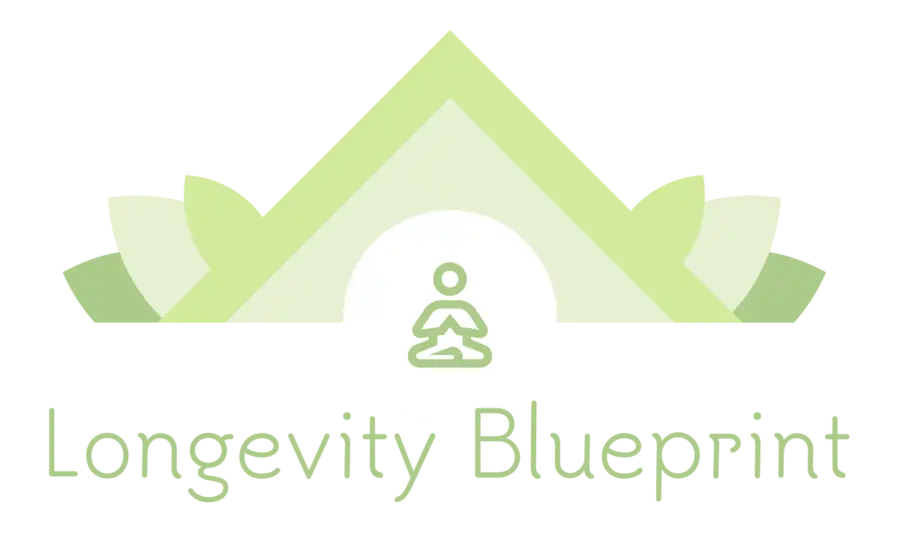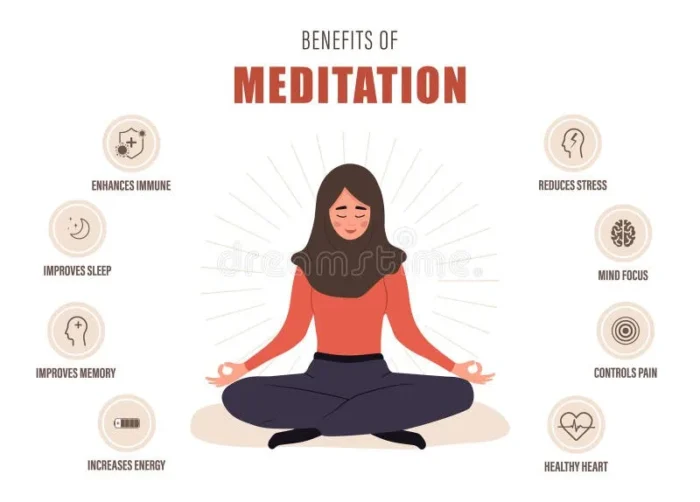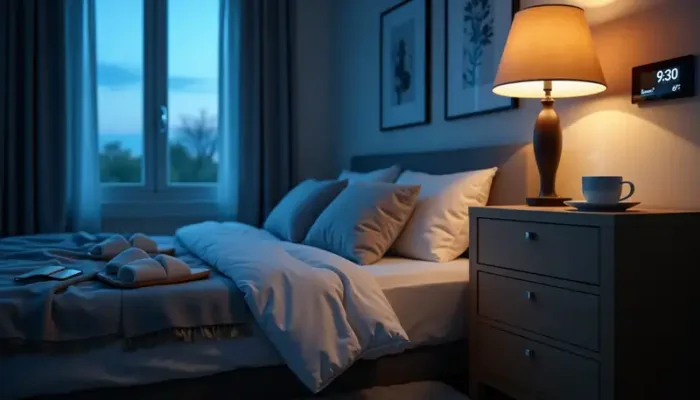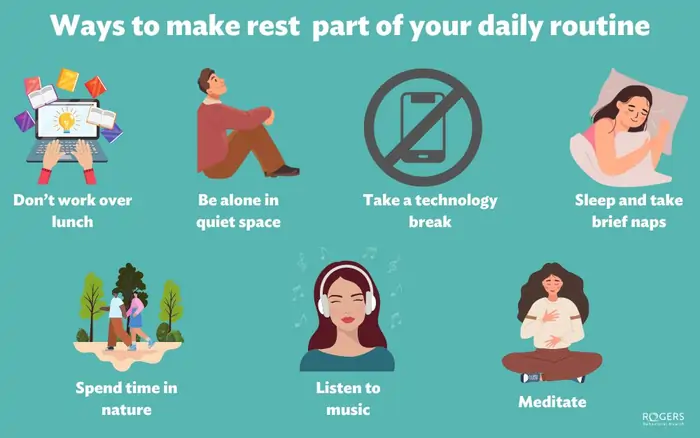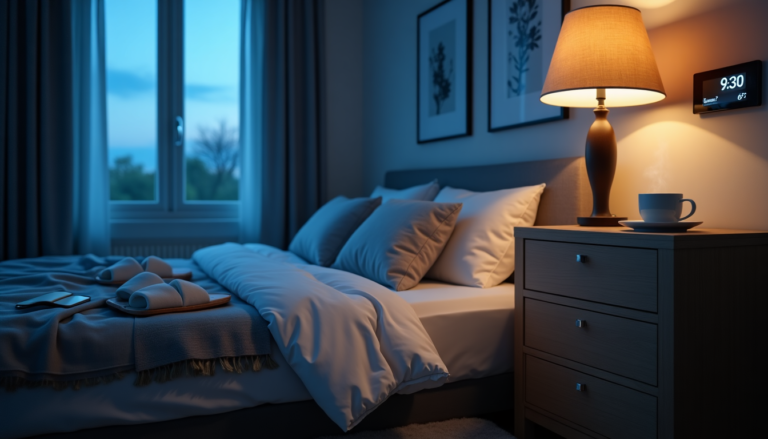How to Get More Deep Sleep Tonight: A Science-Backed Guide
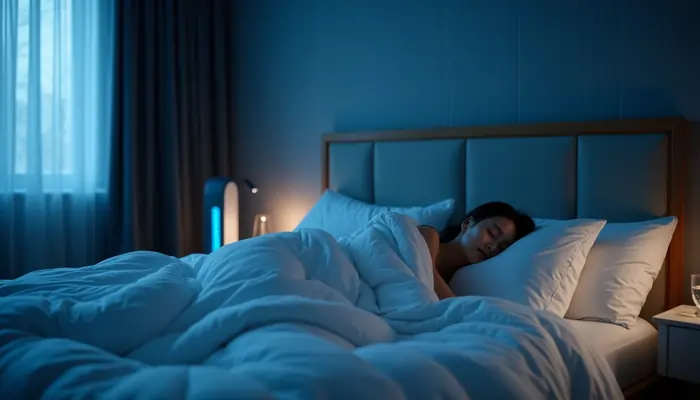
Most adults need 1.5 to 2 hours of deep sleep each night, but we’re not getting enough. Getting more deep sleep could be the missing piece in your wellness puzzle.
Your body goes through vital repairs, builds muscle, and regulates hormones during deep sleep. This critical sleep stage makes up only 10-20% of your total sleep time. Understanding how to boost deep sleep naturally matters a lot to your overall health.
Not getting enough deep sleep can lead to serious problems. Scientists have connected deep sleep loss to higher risks of dementia and Alzheimer’s disease, which shows why this restorative phase needs priority.
You might wonder about how to get more deep sleep and the right amount of deep sleep – experts suggest adults should sleep 7-9 hours total, with about 2 hours of deep sleep.
This piece explores proven ways to improve your deep sleep quality. You’ll learn about creating the perfect bedroom environment (60-67°F works best) and making lifestyle changes that help you get deeper, more restorative rest.
What Is Deep Sleep and Why It Matters
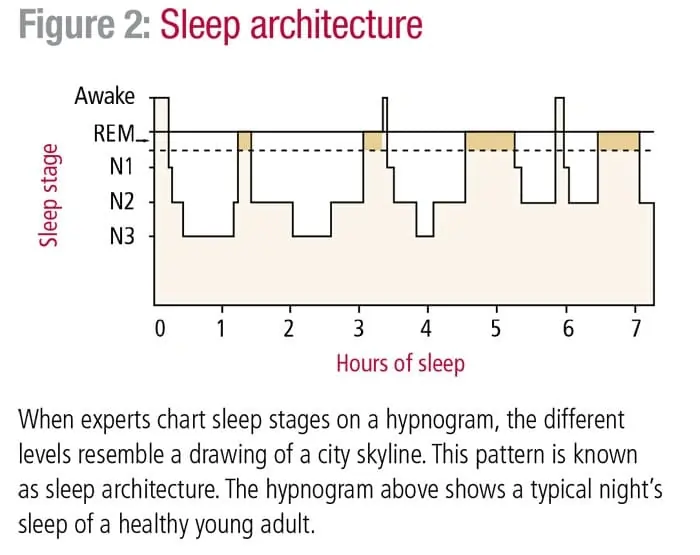
Image Source: HelpGuide.org
Your body goes through different sleep stages while you’re fast asleep. Deep sleep stands out with its exceptional restorative powers.
This stage, technically known as N3 or stage 3 NREM (Non-Rapid Eye Movement) sleep, is where your body does its most important repair work.
Better understanding of this sleep stage could improve your overall health and wellbeing.
The role of NREM stage 3 in body repair
Deep sleep isn’t just another rest phase—it’s your body’s prime restoration period. The sort of thing I love is how your body rebuilds itself at a cellular level during this time.
This repair work goes beyond muscles and tissues.
There’s another reason deep sleep matters: brain detoxification.
This cleaning process forms the foundations of long-term brain health and might prevent neurodegenerative conditions.
Your heart benefits by a lot during this phase.
How deep sleep is different from REM sleep
Deep sleep and REM sleep are both important but serve very different purposes.
Here are the key differences between deep sleep and REM sleep:
Brain Activity: Deep sleep features slow delta waves, while REM shows wake-like activity Physical Recovery: Deep sleep prioritizes bodily repair; REM focuses on mental processes Muscle Tone: Muscles remain relaxed but functional during deep sleep; REM causes temporary paralysis Timing: Deep sleep dominates the first half of the night; REM periods lengthen in the early morning Awakening: It’s much harder to wake someone from deep sleep than REM sleep
Deep sleep represents your body’s true rest mode, unlike REM sleep’s active brain state.
Resources:
How Much Deep Sleep Do You Really Need?
Your body’s deep sleep needs change throughout your life. These requirements evolve as you grow older. Knowing how much deep sleep you need helps you evaluate your sleep quality and adjust your habits accordingly.
Recommended deep sleep by age
Sleep needs vary dramatically during different life stages. Here’s what each age group needs:
Newborns (0-3 months): 14-17 hours Infants (4-12 months): 12-16 hours, including naps Toddlers (1-2 years): 11-14 hours, including naps Preschoolers (3-5 years): 10-13 hours, including naps School-age children (6-12 years): 9-12 hours Teenagers (13-18 years): 8-10 hours Adults (18+ years): 7-9 hours Older adults (65+ years): 7-8 hours
Your body regulates deep sleep based on what it needs.
Why older adults get less deep sleep
Several body changes cause this age-related decrease in deep sleep:
Your brain’s suprachiasmatic nucleus (SCN)—the internal clock—weakens with age.
Hormones play a vital role too.
Deep sleep changes throughout adulthood tell an interesting story:
20-25-year-olds: Average 15.9% deep sleep 50-55-year-olds: Average 14.3% deep sleep 80-85-year-olds: Average 13.1% deep sleep
This decline means more than just another sign of aging like wrinkles or gray hair.
Resources:
- Cleveland Clinic Sleep Basics
- Sleep Foundation
- National Institute on Aging
- University of California, Berkeley Sleep Research
What Happens During Deep Sleep?
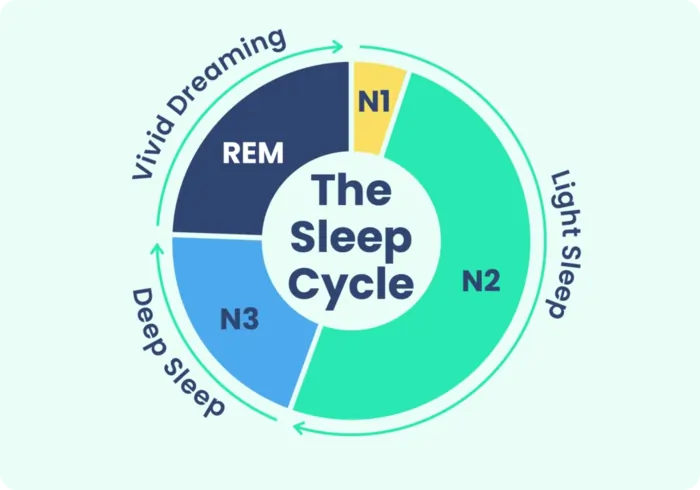
Image Source: Sleep Foundation
“Deep sleep helps maintain brain health by facilitating the removal of waste products.”
— Laura Lewis, Assistant Professor of Biomedical Engineering, Boston University; lead researcher on sleep and brain health
Your body becomes a biological workshop during deep sleep. It activates processes that can only happen while you sleep. Your system works overtime on cell repair, strengthens your immune system, and processes memories—all without your awareness.
Hormone release and immune support
Deep sleep gives your immune system a substantial boost.
Studies from the National Institutes of Health showed that good quality sleep helps produce and program hematopoietic stem cells.
Bad sleep affects your immunity directly.
Deep sleep’s effects on hormones go beyond growth hormone:
- Stabilizes mood and energy levels
- Reduces cortisol, a stress hormone
- Regulates hunger hormones like insulin, leptin, and ghrelin
- Supports thyroid function
Memory consolidation and brain detox
Memory consolidation is one of the most amazing processes that happens during deep sleep.
Your brain sorts through memories from your day during deep sleep.
Sleep creates perfect conditions to consolidate memories.
Deep sleep gives your brain time to organize everything you learned during the day.
Your brain also cleans itself during this time. Science published research that showed a specialized waste removal system—the glymphatic system—becomes ten times more active during sleep [66, 70].
This brain cleaning might explain why deep sleep protects against neurodegenerative conditions.
Dr. Nedergaard, who led this research, puts it simply: “We need sleep.
Resources:
- National Institutes of Health
- Sleep Foundation
- Harvard Medical School
- American Academy of Sleep Medicine
The Science of Brain Activity During Deep Sleep
During deep sleep, your brain undergoes several remarkable processes essential for health and cognitive function:
Delta Waves: The Signature of Deep Sleep
- Frequency Pattern: Delta waves oscillate at 0.5-4 Hz (much slower than waking brain waves)
- Origin: Generated by the thalamus and cortex working in synchrony
- Function: These slow waves coordinate memory consolidation and metabolic clearance
- Measurement: EEG studies show delta wave activity decreases by approximately 25% between young adulthood and middle age
The Glymphatic System: Your Brain’s Nighttime Cleaning Crew
During deep sleep, your brain activates its waste clearance system:
- Cerebrospinal Fluid Flow: Increases by 60% during deep sleep
- Brain Cell Shrinkage: Brain cells temporarily shrink by up to 60% to create wider channels between cells
- Waste Removal: Beta-amyloid and tau proteins (associated with Alzheimer’s) are cleared during this process
- Recovery Time: Just one night of poor sleep can reduce glymphatic clearance by up to 40%
Memory Consolidation During Deep Sleep
- Two-Step Process:
- Initial memories are stored in the hippocampus
- During deep sleep, memories transfer to the neocortex for long-term storage
Research Finding: A 2021 study found that deep sleep quality directly correlated with next-day recall of newly learned information
Synaptic Homeostasis: Synapses that were strengthened during the day are selectively maintained, while others are pruned
Signs You’re Not Getting Enough Deep Sleep

Image Source: Health
Your body knows when it’s not getting enough deep sleep. Learning these warning signs can help you get back to those peaceful nights. Your body sends clear signals when it misses out on restorative sleep—these aren’t random complaints but direct results of poor sleep patterns.
Daytime fatigue and grogginess
That constant tiredness you feel all day, whatever time you spend in bed, usually points to deep sleep deficiency. Sleep inertia—that morning fog lasting more than 30 minutes after waking—shows your slow-wave sleep patterns aren’t working right.
People often confuse excessive daytime sleepiness with being lazy or unmotivated. The truth is it usually comes from poor deep sleep. This exhaustion is different from regular tiredness—you’ll feel a deep, stubborn fatigue that won’t go away even after coffee.
Physical signs of deep sleep deprivation include:
- Constant yawning and rubbing your eyes
- Eyelids that feel heavy and start to close
- Falling asleep during quiet moments
- Needing more and more coffee just to function
- “Microsleeps”—tiny naps lasting just seconds
Your body can’t finish its vital repair work without enough deep sleep. This creates what experts call “sleep debt” that builds up day after day.
Mood swings and poor focus
Poor deep sleep doesn’t just make you tired—it messes with your mind and emotions too. Research from UC Berkeley shows it reduces activity in your prefrontal cortex—where rational thinking happens—while ramping up your amygdala’s emotional responses.
This brain imbalance creates the perfect setup for emotional ups and downs. Small things might make you irritable, you might struggle to control your reactions, or feel anxious for no reason. These mood changes aren’t your fault—they happen because your brain needs more deep sleep.
You might notice these thinking problems:
- Can’t stay focused on work
- Short attention span
- Trouble remembering recent things
- Making decisions becomes harder
- Creative blocks
- Slower reactions
Even simple tasks become tricky—you might read the same thing over and over or forget what you wanted in a room. These mental hiccups happen because your brain can’t properly store memories and repair itself during deep sleep.
Parents should watch out—kids show different signs when they’re not getting enough deep sleep. Instead of looking tired, they often become hyper, act without thinking, and have trouble with emotions. People sometimes mistake these behaviors for ADHD.
Poor deep sleep can trap you in a nasty cycle: bad sleep leads to poor choices that make sleep even worse. Breaking free usually needs some real effort—better sleep habits, fixing your bedroom setup, and maybe some help from a professional.
Everyone has rough nights sometimes, but you should pay attention if these signs keep showing up. The good news? Spotting these signs early lets you fix your sleep before bigger health issues show up.
Resources:
- American Academy of Sleep Medicine
- National Sleep Foundation
- Sleep Research Society
- Harvard Medical School Division of Sleep Medicine
How to Get More Deep Sleep Naturally
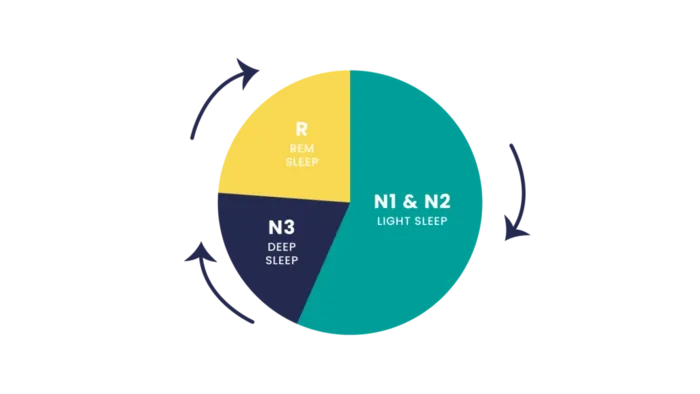
Image Source: Trouble Sleeping
You don’t need fancy gadgets or prescription medications to get better deep sleep. Research shows several natural ways can substantially improve how much deep sleep you get and how well you sleep.
A few simple changes to your daily routine can create the perfect environment for those valuable slow-wave sleep periods.
Stick to a consistent sleep schedule
Your body runs on routine, especially with sleep.
This makes it harder to fall asleep fast and get the deep sleep your body needs.
The original adjustment might feel tough, especially if you love staying up late on weekends.
Why consistency matters: Your sleep schedule tells your brain’s sleep-wake system when to rest. Random schedules leave your body guessing when to prepare for sleep, and you might get less deep sleep each night.
Avoid screens and bright lights before bed
Here’s what you can do:
Switch off all electronic devices at least an hour before bed Lower screen brightness or use night mode if you must use devices Remove all screens (TVs, computers, phones) from bedrooms Read physical books instead of using screens at night
Use relaxation techniques like meditation
New to meditation?
Resources:
- American Academy of Sleep Medicine
- Sleep Foundation
- National Institutes of Health
- Harvard Medical School Division of Sleep Medicine
Related post: How Meditation Can Help You Live Longer?
Optimize Your Sleep Environment

Image Source: Sleep Foundation
A good night’s sleep starts with your bedroom setup. Your brain needs the right environment to reach and maintain restorative slow-wave sleep. Several elements play a vital role in this process.
Ideal room temperature and lighting
Room temperature significantly affects how well you sleep.
Rooms that are too warm make it hard for your body to regulate temperature.
Light exposure can throw off your sleep patterns.
Choosing the right mattress and pillow
Your sleep position and body type should determine your mattress and pillow choice. Side sleepers usually sleep better on softer mattresses that help with pressure points.
Using white noise or blackout curtains
White noise helps mask disturbing sounds that might wake you up.
Resources:
- Sleep Foundation
- National Institutes of Health
- Cleveland Clinic
- American Academy of Sleep Medicine
Related post: Perfect Night Routine
Lifestyle Habits That Support Deep Sleep
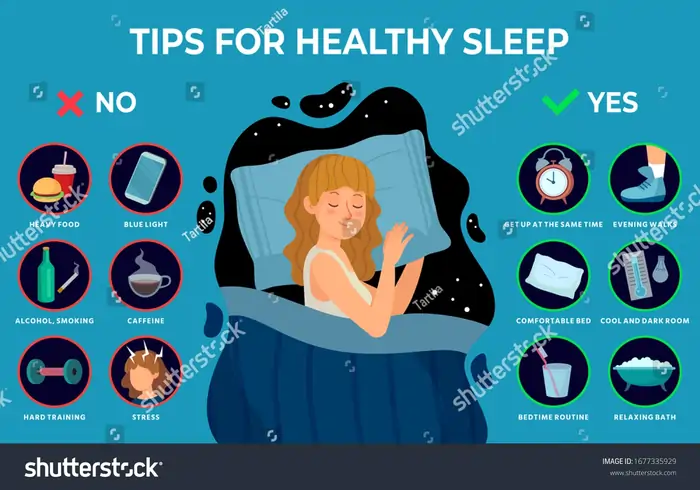
Image Source: Shutterstock
“A good laugh and a long sleep are the two best cures for anything.”
— Irish Proverb, Traditional wisdom
Your daily routine choices can make a big difference in how deeply you sleep at night. Simple changes to what you do during the day lead to better slow-wave sleep periods.
Exercise timing and intensity
Regular physical activity boosts sleep quality, but timing plays a crucial role.
Limiting caffeine, alcohol, and nicotine
These everyday substances can change how you sleep.
Caffeine’s effects on sleep might surprise you.
Eating light meals before bed
Resources:
- Sleep Foundation
- American Academy of Sleep Medicine
- National Sleep Foundation
- Harvard Medical School Division of Sleep Medicine
Nutrition for Deeper Sleep: Beyond the Basics
What you eat—and when you eat it—significantly impacts your deep sleep quality:
Deep Sleep-Promoting Foods
| Food | Sleep-Enhancing Compounds | Recommended Timing |
|---|---|---|
| Tart cherries | Natural melatonin, antioxidants | 1-2 hours before bed |
| Kiwi fruit | Serotonin, antioxidants, folate | 1 hour before bed |
| Fatty fish (salmon) | Vitamin D, omega-3 DHA | Dinner (3-4 hours before bed) |
| Walnuts | Melatonin, magnesium, omega-3 | Small handful 1 hour before bed |
| Oatmeal | Complex carbs, melatonin | 2 hours before bed |
Specific Supplements with Research Support
- Magnesium Glycinate: 300-400mg before bed can increase deep sleep time by improving GABA availability
- L-theanine: 200mg promotes relaxation without drowsiness
- Glycine: 3g improves subjective sleep quality and reduces daytime sleepiness
Timing Your Nutrients
Hydration Cutoff: Reduce fluids 90 minutes before bed to minimize sleep disruptions
Ideal Dinner Window: 3-4 hours before bedtime
Bedtime Snack (if needed): Small, carbohydrate-based snack with protein 45 minutes before bed
Technology for Better Deep Sleep
Technology offers powerful tools to enhance your deep sleep quality:
1. Sound Therapy Beyond White Noise
While white noise works for some, research shows other sound frequencies may be more effective for promoting deep sleep:
- Pink Noise: Contains all audible frequencies but with more power in the lower frequencies. Studies from Northwestern University show pink noise can increase deep sleep by up to 45% and improve memory in older adults.
- Brown Noise: Even deeper than pink noise, brown noise contains stronger low-frequency sounds that many find more soothing for sleep.
- Delta Wave Soundscapes: Specifically engineered sounds that match the 0.5-4 Hz frequency of delta brainwaves during deep sleep.
2. Sleep Tracking Technology
Modern sleep trackers can help you understand your current deep sleep patterns and measure improvements:
- Wearable Devices: Oura Ring, Whoop, and advanced Fitbit models track sleep stages including deep sleep with reasonable accuracy
- Non-Wearable Options: Devices like the Withings Sleep Analyzer (placed under your mattress) track sleep without requiring you to wear anything
- Apps with Sleep Algorithms: While less accurate than dedicated devices, apps like Sleep Cycle can provide basic sleep stage tracking using your smartphone
3. Smart Bedroom Integration
Air Quality Monitors: Devices that measure and improve bedroom air quality have been shown to improve deep sleep in sensitive individuals
Automated Temperature Control: Smart thermostats like Nest can automatically lower your bedroom temperature to 65°F at bedtime
Programmable Lighting: Phillips Hue and similar systems can gradually dim lights and filter out blue light before bed
When to Seek Help for Sleep Issues
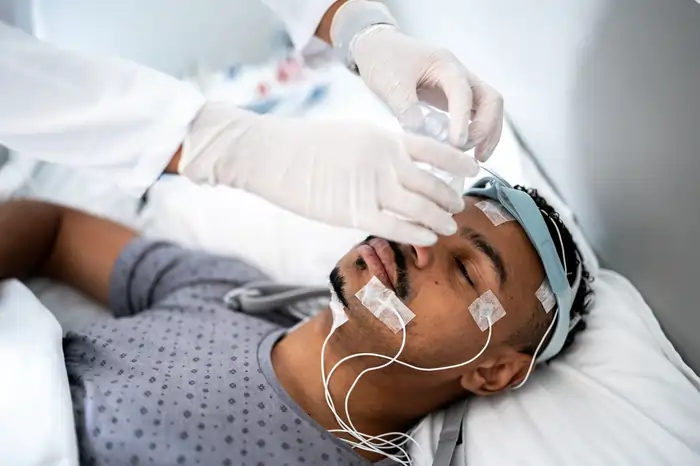
Image Source: Sleep Foundation
Sleep problems often improve with lifestyle changes, but some conditions need a doctor’s help. It’s vital to know the right time to get medical help to protect your sleep quality and overall health.
Sleep apnea and other disorders
- Obstructive sleep apnea: When air can’t flow into or out of your nose or mouth despite breathing efforts
Central sleep apnea: When your brain doesn’t send proper signals to breathing muscles
- Insomnia (difficulty falling or staying asleep)
- Restless leg syndrome (tingling sensations with urge to move legs)
- Parasomnia (unusual behaviors like sleepwalking or sleep talking)
Circadian rhythm disorders (disrupted sleep-wake cycle)
How sleep studies can help
Sleep studies (polysomnography) track several body functions during sleep, such as:
- Brain wave activity
- Eye movements
- Breathing rate
- Blood pressure
Heart rate and electrical activity
These tests collect data through a full night’s sleep to spot disorders that affect deep sleep.
Most in-lab sleep studies use a split-night approach.
When to talk to a doctor
- Taking more than 30 minutes to fall asleep regularly
- Multiple night-time wakings with trouble getting back to sleep
- Daytime sleepiness or falling asleep at wrong times
- Loud snoring with gasping or choking sounds
Creeping sensations in limbs that movement relieves
Resources:
- American Academy of Sleep Medicine
- National Sleep Foundation
- Cleveland Clinic Sleep Disorders Center
Real Results: Deep Sleep Transformation Stories
Case Study 1: Executive with Chronic Sleep Deficit
Client Profile: 42-year-old technology executive with 5+ years of sleep difficulties
Initial Assessment:
- Deep sleep: 35 minutes per night (tracked via Oura Ring)
- Primary complaints: Difficulty concentrating, afternoon energy crashes
- Lifestyle factors: High stress, evening screen time, irregular sleep schedule
Implemented Changes:
- Consistent 10:30 PM bedtime (including weekends)
- Bedroom temperature lowered to 65°F
- Digital sunset protocol 90 minutes before bed
- Magnesium glycinate supplementation (350mg)
Results After 3 Weeks:
- Deep sleep increased to 1 hour 15 minutes (114% improvement)
- Morning grogginess eliminated
- Sustained energy throughout workday
- Improved mood reported by family members
Case Study 2: Post-Menopausal Sleep Disturbances
Client Profile: 58-year-old woman, post-menopausal for 6 years
Initial Assessment:
- Deep sleep: 42 minutes average (medical-grade sleep study)
- Primary complaints: Multiple nighttime awakenings, difficulty returning to sleep
- Contributing factors: Hot flashes, anxiety about sleep quality
Implemented Changes:
- Pink noise sound machine
- Consistent sleep/wake schedule (including weekends)
- Bedding and sleepwear optimized for temperature regulation
- Evening supplementation with glycine (3g) and tart cherry extract
Results After 4 Weeks:
- Morning cortisol levels normalized (verified by testing)
- Deep sleep increased to 1 hour 5 minutes (55% improvement)
- Night awakenings decreased from 4-5 to 1-2
- Subjective sleep quality rating increased from 3/10 to 8/10
Conclusion
Deep sleep forms the bedrock of our physical and mental well-being. This piece has shown how this vital sleep stage repairs our bodies, cleanses our brains, and strengthens our immune systems [138]. Research clearly demonstrates that insufficient deep sleep makes our health suffer in many ways.
You don’t need expensive equipment or medications to get better deep sleep. Simple changes to your daily routine can boost sleep quality by a lot.
A consistent sleep schedule, bedroom temperatures between 65-68°F, and reduced screen time before bed create ideal conditions for restorative rest [139].
The choices you make in your daily life directly affect how well you sleep. Physical activity at the right time, smart eating habits, and relaxation practices like meditation lead to deeper, more restorative sleep [140].
Your daytime activities shape what happens when your head hits the pillow.
Age brings natural decreases in deep sleep, but poor sleep quality isn’t inevitable. Good sleep habits can help balance these age-related changes [141]. On top of that, it helps to track your sleep patterns to learn about what improves or disrupts your deep sleep cycles.
Sleep problems that persist and affect your daily life despite these strategies might need expert help. A sleep specialist can help, especially with conditions like apnea that need professional care and can harm your overall health if left untreated [142].
Sleep makes up one-third of our lives, yet we often take it for granted. Make tonight the start of your commitment to better deep sleep using these science-backed strategies. Small, steady changes often lead to lasting improvements in sleep quality.
Resources:
- American Academy of Sleep Medicine
- National Sleep Foundation
- Harvard Medical School Division of Sleep Medicine
- Cleveland Clinic Sleep Disorders Center
FAQs
What are some effective ways to increase deep sleep naturally?
To boost deep sleep, maintain a consistent sleep schedule, avoid screens before bed, create a cool and dark sleeping environment, exercise regularly (but not too close to bedtime), and practice relaxation techniques like meditation. These habits help optimize your body’s natural sleep cycles.
How much deep sleep do adults typically need each night?
Most adults need between 1.5 to 2 hours of deep sleep per night, which is about 20-25% of total sleep time. This amount can vary slightly based on individual factors and tends to decrease with age.
What happens to our bodies during deep sleep?
During deep sleep, your body undergoes crucial restorative processes. This includes releasing growth hormones for tissue repair, strengthening the immune system, consolidating memories, and clearing toxins from the brain through the glymphatic system.
What are some signs that I’m not getting enough deep sleep?
Signs of insufficient deep sleep include persistent daytime fatigue, difficulty concentrating, mood swings, weakened immune function, and feeling unrefreshed even after a full night’s sleep. You may also experience increased cravings for high-calorie foods.
When should I consult a doctor about my sleep issues?
You should consider talking to a doctor if sleep problems persist for more than three months and affect your daily functioning. Warning signs include regularly taking more than 30 minutes to fall asleep, waking up multiple times during the night, feeling excessively sleepy during the day, or experiencing loud snoring with gasping or choking sounds.
